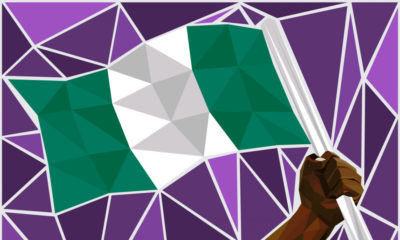Features
Chukwuemeka Mba-Kalu: The Untold Nigerian Stories
 I didn’t know I could recognize Nigerians by face until the day I met Chika. It was my first week of school in New York, and I was walking to the dining hall when I saw him. He was also walking alone and I realized that he had a very “Nigerian-looking head” (I don’t know what that means either). At first, I was going to walk past with a straight face, act cool, and probably hope to see him again some other time. I didn’t do that…after I walked a few steps past him, I turned back and promptly asked, “Are you Nigerian?” – “Yes,” he replied.
I didn’t know I could recognize Nigerians by face until the day I met Chika. It was my first week of school in New York, and I was walking to the dining hall when I saw him. He was also walking alone and I realized that he had a very “Nigerian-looking head” (I don’t know what that means either). At first, I was going to walk past with a straight face, act cool, and probably hope to see him again some other time. I didn’t do that…after I walked a few steps past him, I turned back and promptly asked, “Are you Nigerian?” – “Yes,” he replied.
Chika and I went on to form a strong relationship in our first year, along with some other Nigerians we discovered in school. We went together for many African Student Union meetings, and joined many clubs. Since we were both business-inclined students, we also had many classes together.
Chika is only Nigerian by origin. He was born in the United States and has lived there all his life, visiting Nigeria only two times. He has an American accent; he only understands Igbo slightly, and I always laugh when he decides to turn his Nigerian accent on. In spite of this, he isn’t ignorant about many of the concepts that I grew up with. He knows a lot about the realities of the corruption and terrorism that plagues the country. He also understands enough about Nigeria for me to relate with him and have sensible discussions with him about the country.
He, however, always seems emotionally detached from Nigeria. His relationship with Nigeria is similar to one between a man and his divorced wife. He knows enough about Nigeria to possibly become passionate about it, but never wants to. In the months after we became friends, I sensed his hesitance. He always replied questions like “Would you like to return to Nigeria after graduation?” and “Will you support Nigeria in the World Cup?” with a shook head and a short smile, indicating a lack of interest. Being a huge lover for my country, I often tried to push him to attach to his origins a bit more but he was unresponsive. I, however, took these responses with a pinch of salt until he submitted his story for Torinu.com, a website I launched with a friend two weeks ago.
After reading Chika’s story, I instantly understood why he was so detached from Nigeria and how his past has played a major part on who he is today. His love-hate relationship with Nigeria, is complimented by his history with our country and his uneventful youthful experiences. This taught me an important lesson about the danger of the single story; and more importantly, the necessity of storytelling in Nigeria.
I have listened to my foreign friends talk about the centuries of history of their respective countries like it happened yesterday. They have also expressed how certain happenings in the past still affect their countries today and despite not witnessing any of the past events, it drives their motivation to enact change. These conversations changed my opinion of their national pride, which I previously thought was blind. They aim to avoid and fix the mistakes their ancestors made, and I know they will succeed because they are aware of these mistakes.
When I look at Nigeria’s current situation today, I see the plagues of corruption and terrorism, the nightmares of kidnapping and human trafficking, and the tribalism that still lingers. I am unfortunately incapable of connecting the dots or trying to identify the root cause of these issues. Why? It is because Nigerians that are old enough never discuss our history, while many from the younger generation have never even heard it. In school I never learned about the slave trade, colonialism or the civil war, and people I know that lived through the war have chosen to avoid discussing the topic with me. Through Chika and my friends, I have learned that the past explains present circumstances, and without this chain of thought we will never be able to understand our current identity. Therefore, we need to start telling these stories and sharing our experiences in order to enlighten one another. By doing this, we will learn from the past, strive in the present and excel in the future.
More importantly, avoiding the dangers of the single story is necessary for Nigeria. If you Google the word “Nigeria” today, the news is filled with news of terrorism, corruption, bad governance, and irresponsibility. While a lot of these themes are reflective of the Nigerian system, it does not paint an accurate enough picture. We are not a country full of corrupt people and terrorists; we are a country full of people who wake up every morning, step out of the door, and actively try to make the world a better place. How can we prevent this one-sided narrative of Nigeria?
I have created an online platform with a friend, which will focus solely on telling Nigerian stories. We want to gather experiences of many different Nigerians – good or bad – and bring them together in one place. Coming from the same country, we have the similar traits and thoughts that unite us. We have the intent of telling the numerous stories of Nigerians, and creating an accurate image of what the average Nigerian faces daily. By doing so, we hope we can start a conversation of how Nigerian stories should be told and expressed. These stories can act as a springboard for a better tomorrow; a tomorrow when we will be able to speak freely as a country with an undebated history and an unbiased image in the press. We may never be able to completely avert the effects of the untold Nigerian stories but with regards to the future, prevention is better than cure.
Photo Credit: Dreamstime | Photographerlondon























